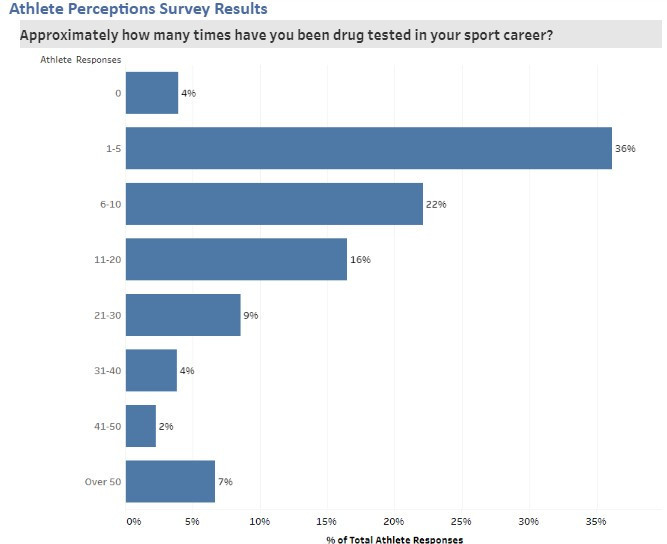The Olympics are the pinnacle of athletic achievement. Every four years, athletes from around the world compete for gold, silver, and bronze medals in a variety of sports. As such, it is essential that Olympic athletes compete on a level playing field, free from the performance-enhancing effects of banned substances. But how often are Olympic athletes drug tested to ensure fairness? In this article, we will explore the drug testing procedures of the Olympic Games and how often athletes are tested for banned substances.
Olympic athletes are drug tested regularly throughout the year, as well as during the Olympic Games. The World Anti-Doping Agency (WADA) is responsible for monitoring and testing athletes for banned substances. All athletes in the Olympic Games are subject to anti-doping tests, including pre-competition and post-competition tests. In-competition tests include athletes from all sports, from all countries and from all levels of competition. The WADA also has the power to test out-of-competition, at any time, any place, and without prior notice.

Contents
Olympic Athletes Drug Testing Overview
Drug testing of athletes is an integral part of the Olympic Games, and athletes are subject to rigorous testing procedures before, during, and after the Games. The International Olympic Committee (IOC) and its member national Olympic Committees have a zero-tolerance policy towards doping, and athletes who test positive for prohibited substances are barred from competing. This article will discuss how often Olympic athletes are drug tested and the procedures and protocols that are in place.
Testing Protocols and Procedures
The World Anti-Doping Agency (WADA) sets the rules and protocols for drug testing during the Games. All athletes are required to provide a urine sample for testing before and after each event. In addition, random testing is conducted throughout the Games in order to ensure that all athletes are complying with the regulations. The IOC also has the authority to request additional testing at any time, even after the competition has concluded.
The IOC works with the National Anti-Doping Organizations (NADOs) of participating countries to ensure that athletes are subject to consistent and effective testing. The samples are analyzed at accredited laboratories, and athletes who test positive for any prohibited substances are subject to sanctions, including suspension from competing and possible disqualification from the Games.
Frequency of Testing
The frequency of testing depends on the type of athlete and the sport they are competing in. Athletes who are considered “at risk”, such as those who have tested positive for drugs in the past, or those who are competing in events that have a higher risk of doping, are tested more frequently than other athletes. The IOC also has the power to mandate additional testing if they believe that an athlete is not complying with anti-doping regulations.
The IOC also works with the NADOs of participating countries to conduct out-of-competition testing. This is a critical component of the anti-doping program, as it allows the IOC to detect athletes who may be using prohibited substances outside of the Olympic Games.
Testing Results and Penalties
All drug testing samples are analyzed at accredited laboratories, and results are released within a few days of the testing. Athletes who test positive for any prohibited substances are subject to a variety of sanctions, depending on the severity of the offense. The most severe sanctions include disqualification from the Olympic Games and a lifetime ban from competing.
IOC Sanctioning Process
The IOC has a strict sanctioning process in place for athletes who test positive for banned substances. The athlete is first notified of the positive test result, and then given the opportunity to explain their actions and provide any evidence or information that may be relevant to their case. The athlete then has the right to a hearing before the IOC Disciplinary Commission, which will decide on the appropriate sanction.
Monitoring and Compliance
The IOC and its NADOs are responsible for monitoring the compliance of athletes with anti-doping regulations. This includes conducting out-of-competition testing, as well as random testing before and after the Olympic Games. The IOC also works with WADA to ensure that the latest testing methods and technologies are being used.
The IOC and its NADOs also work with sports federations and national sports organizations to provide education and information about anti-doping regulations and the importance of compliance. This helps to ensure that athletes are aware of the rules and that they are aware of the consequences of breaking them.
Top 6 Frequently Asked Questions
Q1. How often are Olympic athletes drug tested?
A1. Olympic athletes are typically subject to year-round testing, with all athletes required to provide a detailed whereabouts form in order for them to be available for testing. Depending on the sport and the athlete’s individual circumstances, athletes may be tested up to several times a month. During the Olympic Games, athletes are subject to additional testing, which is coordinated and managed by the International Olympic Committee (IOC). The IOC typically conducts hundreds of tests during the Olympic Games, with each sport and athlete tested depending on the level of suspicion. All athletes are subject to pre-competition and post-competition testing, with additional testing conducted if deemed necessary.
How athlete drug testing works
The Olympic Games are a pinnacle of athletic excellence, and part of that excellence is ensuring that athletes are competing fairly and without the use of performance enhancing drugs. As such, Olympic athletes are subject to rigorous drug testing protocols before and during the Games. With the IOC’s strict rules, frequent testing, and the threat of disqualification, Olympic athletes have a strong incentive to stay clean. This is a critical part of upholding the integrity of the Games and allowing athletes to compete on a level playing field.
